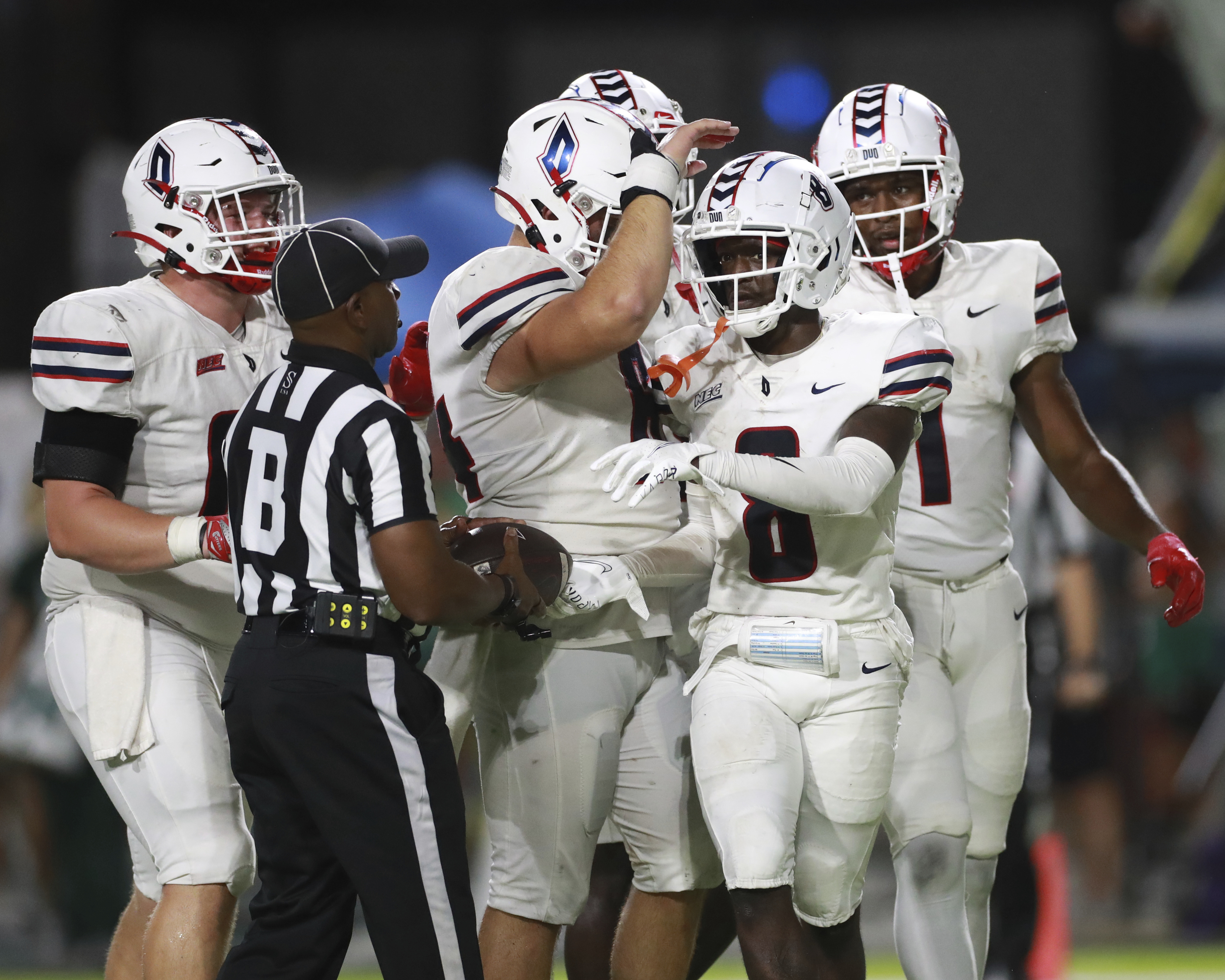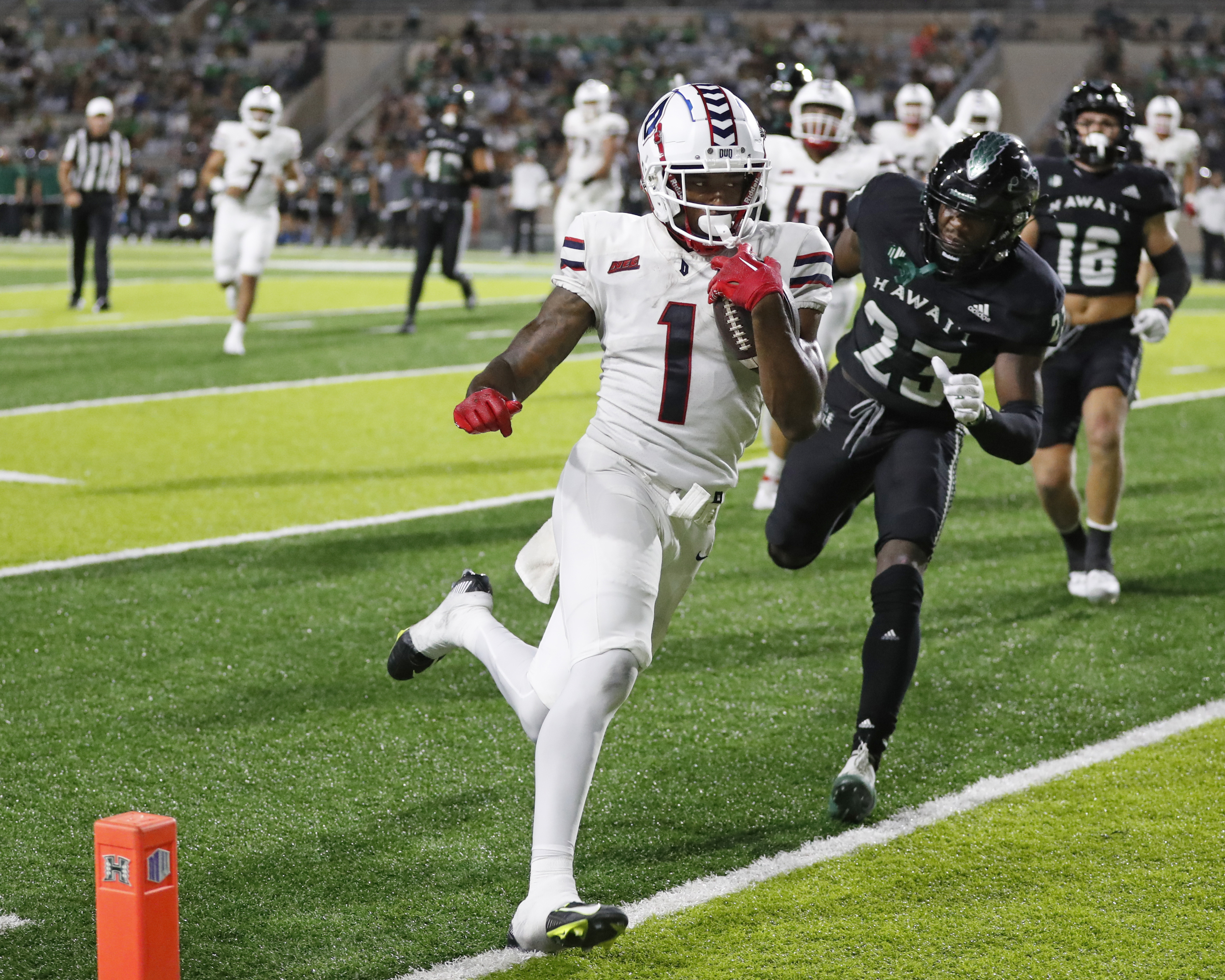
Facilitating financial interest
On Sept. 4, 2021, Duquesne’s football program ended a 71-year drought.
The Dukes traveled to Fort Worth, Texas, to play the TCU Horned Frogs to open the 2021 football season. Duquesne fell to TCU 45-3, but it was the first modern-day Power Five team the Dukes had played since a 1950 game against Clemson.
The next year, Duquesne clashed against Florida State in a “Week Zero” season opener. The Seminoles won that matchup 47-7, but it marked a distinct uptick in competition that the Dukes hadn’t faced since Harry Truman was in office.
This season, Duquesne is set to play West Virginia on Sept. 9, marking the third consecutive season the Dukes have played a Power Five school.
Duquesne is a member of the Northeast Football Conference, which is in the lower-level Football Championship Subdivision (FCS). Scheduling for a nonconference opponent, especially schools the caliber Duquesne has been playing, takes place years in advance.
Duquesne president Ken Gormley has credited the combination of longtime head coach Jerry Schmitt and athletic director Dave Harper, who was hired a month before Gormley, as the main facilitators in Duquesne’s schedule creation.
“The combination of those two guys has been just fabulous,” Gormley said. “There’s no question when I came as president, one of the things I wanted to do was elevate athletics.”
Blast to the past
Duquesne football was a powerhouse program in the 1930s and early 1940s. The Dukes finished nationally ranked three times — No. 14 in 1936, No. 10 in 1939 and No. 8 in 1941 — and won the Orange Bowl twice, although the first Orange Bowl victory was when the bowl game was called the Festival of Palms Bowl. In 1941, Duquesne allowed a measly 21 points during the season, a figure that has been tied only one time since then.
Duquesne’s dominance came to an end when the school was among the first to cancel football during World War II. Although the program returned in 1947, it was disbanded after the 1950 season before returning as a club team nearly two decades later in 1969. Duquesne has been rebuilding the program since then.
Gormley, along with Harper and Schmitt, has helped elevate the modern-day football rebuild. Gormley has been a part of Duquesne’s faculty for 29 years, including his promotion to university president. Before Gormley’s promotion, he recalled alumni complaining “constantly” about the inadequacy of Duquesne athletics.
On top of the three Power Five teams Duquesne has scheduled, the school has played more Football Bowl Subdivision (FBS) teams in general since Gormley and Harper arrived, including two contests against Hawaii, a 2021 game vs. Ohio and a 2018 affair against UMass.
Duquesne was also set to play Air Force and Coastal Carolina in 2020, but the season was scrapped due to COVID-19. Instead, Duquesne will play Coastal Carolina this upcoming season.
The 2021 matchup against Ohio was particularly notable because the Dukes were able to pull off a 28-26 victory thanks to a defensive stand against Ohio’s game-tying two-point conversion attempt. The win marked the first time any NEC team had beaten an FBS team.
“When we were fortunate enough to beat Ohio, it raised some eyebrows amongst some MAC schools about us,” Harper said. “Obviously, they want to try to schedule an opponent that they can hopefully win against, but I think we’re in a good place to be an opponent for an FBS school because we’re competitive enough.”
Money matters
Eyebrows were certainly raised, as Duquesne will play Toledo in 2024 and Akron in 2025 as nonconference opponents.
While a part of the goal is to “augment the experience” for the players, in the words of Harper, the end game for Gormley is to create more exposure for the university.
On top of the higher-quality football opponents, Duquesne provided a $50 million renovation to UPMC Cooper Fieldhouse for the school’s basketball team that was completed in 2020. The basketball program also played Kentucky last season, revealing even more evidence in a push for athletics as a whole.
Gormley said a renovation to the Dukes’ Rooney Field is also being looked at.
Outside of the athletics scope, Duquesne is building its new College of Osteopathic Medicine that will be finished in 2024, as well as a new engineering program.
“There’s lots of energy at the university as a whole,” Gormley said. “When you add athletics really expanding its reach and playing major heavy hitters across the country, it really elevates the exposure of the university.”
Putting Duquesne on the map will rake in revenue for the school to advance beyond the athletic sector. However, the game itself also provides a nice payday for the program.
When an FBS team schedules a home game against an FCS team, such as last year’s Florida State vs. Duquesne game, the FCS team is often rewarded with a guaranteed payment because of the lopsided odds.
For example, Duquesne received $400,000 to play Florida State in Tallahassee, according to the game contract. Other elements that may be paid for are travel expenses and other similar costs. According to a copy of the contract that FBSchedules.com obtained from West Virginia, they will be paying Duquesne $425,000 for that game.
The payment Duquesne receives goes right back into the football budget.
“Nothing gets cheaper, ever,” Harper said. “Whenever we can help subsidize our football budget to help with all of our operations, our recruiting, just the cost of running a program, it’s obviously a windfall for us and very helpful.”
Duquesne is permitted up to 45 full-ride scholarships by the NEC, which can be divided up into equivalencies or partial scholarships, with some players receiving federal and academic aid.
Even in the FCS, Duquesne is at a scholarship disadvantage, as the FCS maximum is set at 63 full-ride scholarships. For reference, FBS teams are allowed up to 85 full-ride scholarships.
Still, Gormley, Harper and Schmitt are all committed to growing Duquesne’s football program and giving the players the best college experience they possibly can. The root of all that, though, comes from scheduling.
“For our guys, it’s that opportunity for development,” Schmitt said. “It lets them recognize how they can stretch themselves to a higher level because they have to against programs like those schools and the athletes that they have.”

